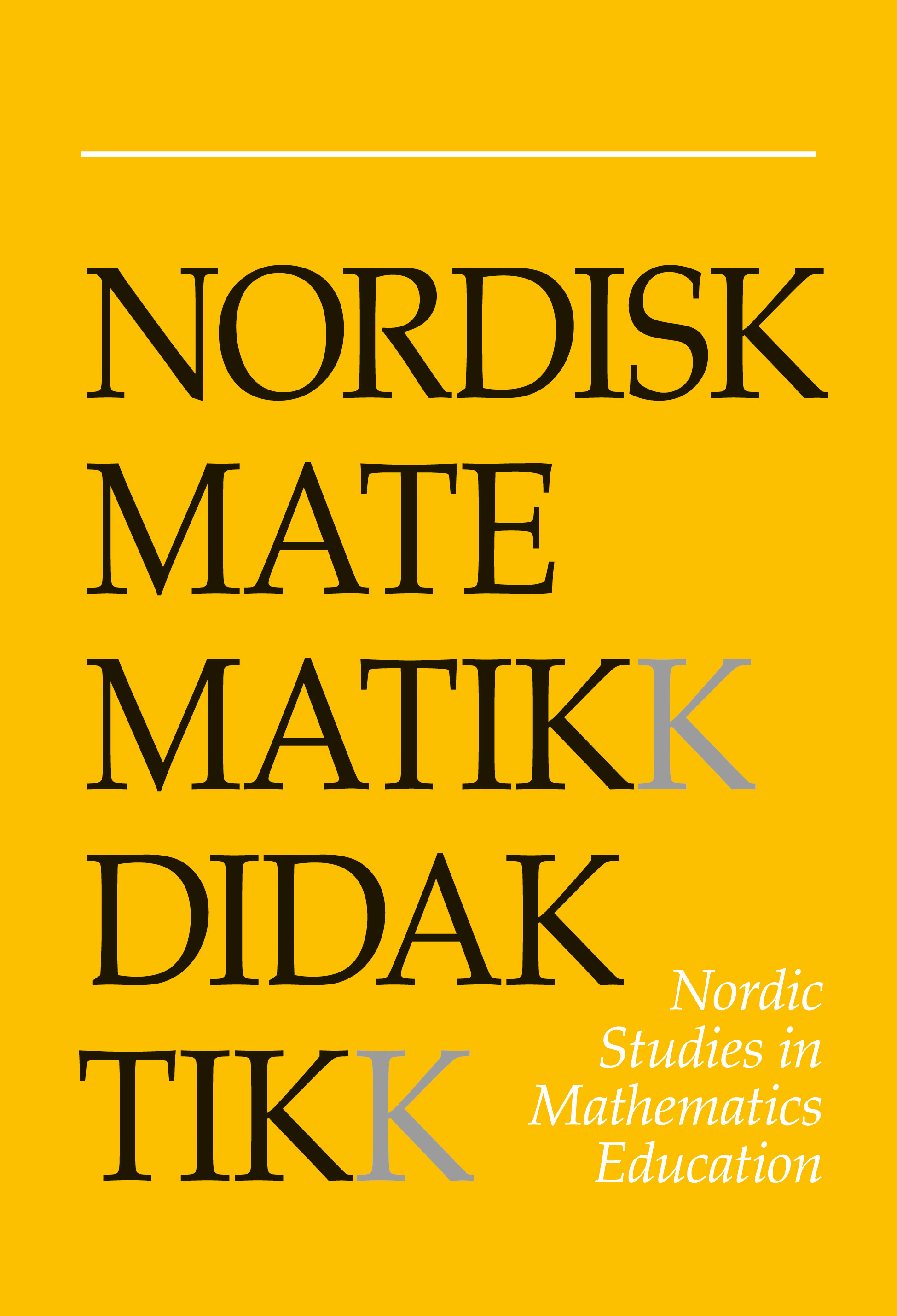Developing mathematical reasoning by using questions in a multilingual mathematics classroom
DOI:
https://doi.org/10.7146/nomad.v23i3-4.148963Abstract
In this paper, students’ questions while working in small groups on mathematical problem-solving tasks are investigated. In order to improve students’ reasoning and communication abilities in mathematics, an intervention study was designed in a multilingual upper secondary mathematics classroom in Sweden. In their discussions students used Swedish, which was their second language and also the language of instruction. The changes in students’ ways of using questions across the three cycles of the intervention were analysed. The results showed how students over the cycles changed their ways of framing questions from looking for the correct answer towards clarifying other students’ meaning in order to understand each other’s reasoning. The implication from the study is that it is important to promote interactions between students rather than focusing on students’ need to develop their second language competencies.
References
Alfredsson, L., Bråting, K., Erixon, P. & Heikne, H. (2011). Matematik 5000: lärobok. Kurs 1b grön [Mathematics 5000: Mathematics book. Course 1b green]. Stockholm: Natur och Kultur.
Alrø, H. & Skovsmose, O. (2004). Dialogue and learning in mathematics education. Intention, reflection, critique. Dordrecht: Kluwer Academic.
Brandt, B. & Schütte, M. (2010). Collective mathematical reasoning in classrooms with a multilingual body of pupils. In U. Gellert, E. Jablonka & C. Morgan (Eds.), Proceedings of the sixth international mathematics education and society conference (pp. 111-114). Berlin: Freie Universität Berlin.
Ding, M., Li, X., Piccolo, D. & Kulm, G. (2007). Teacher interventions in cooperative-learning mathematics classes. The Journal of Educational Research, 100 (3), 162-175. https://doi.org/10.3200/JOER.100.3.162-175
Dominguez, H. (2011). Using what matters to students in bilingual mathematics problems. Educational Studies in Mathematics, 76 (3), 305-328. https://doi.org/10.1007/s10649-010-9284-z
Drageset, O.-G. (2014). Redirecting, progressing, and focusing actions - a framework for describing how teachers use students' comments to work with mathematics. Educational Studies in Mathematics, 85 (2), 281-304. https://doi.org/10.1007/s10649-013-9515-1
Eerde, D. van & Hajer, M. (2009). The integration of mathematics and language learning in multiethnic schools. In M. César & K. Kumpulainen (Eds.), Social interactions in multicultural settings (pp. 269-296). Rotterdam: Sense Publishers. https://doi.org/10.1163/9789087907174_012
Eerde, D. van, Hajer, M. & Prenger, J. (2008). Promoting mathematics and language learning in interaction. In J. Deen, M. Hajer & T. Koole (Eds.), Interaction in two multicultural mathematics classrooms (pp. 31-68). Amsterdam: Aksant.
Esmonde, I. (2009). Ideas and identities: supporting equity in cooperative mathematics learning. Review of Educational Research, 79 (2), 1008-1043. https://doi.org/10.3102/0034654309332562
Fuentes, S. Q. (2009). The evolution of one teacher's interactions with students working in small groups to improve their communication, self-regulating, and problem-solving skills [PhD thesis]. Montclair State University.
Fuentes, S. Q. (2013). Fostering communication between students working collaboratively: results from a practitioner action research study. Mathematics Teacher Education and Development, 15 (1), 48-71.
Gutiérrez, R. (2008). A "gap-gazing" fetish in mathematics education? Problematizing research on the achievement gap. Journal for Research in Mathematics Education, 39 (4), 357-364. https://doi.org/10.5951/jresematheduc.39.4.0357
Halai A., Muzaffar I., Valero P. (2016) Research rationalities and the construction of the deficient multilingual mathematics learner. In R. Barwell et al. (Eds.), Mathematics education and language diversity. New ICMI study series (pp. 279-295). Cham: Springer. https://doi.org/10.1007/978-3-319-14511-2_15
Hansson, Å. (2011). Ansvar för matematiklärande. Effekter av undervisningsansvar i det flerspråkiga klassrummet (Responsibility for mathematics learning. Effects of instructional responsibility in the multilingual classroom) (PhD thesis). Gotheburg University. Retrieved from http://hdl.handle.net/2077/26669
Langer-Osuna, J. M., Moschkovich, J., Norén, E., Powell, A. B. & Vazquez, S. (2016). Student agency and counter-narratives in diverse mathematics classrooms: challenging deficit perspectives. In R. Barwell et al. (Eds.), Mathematics education and language diversity. New ICMI study series (pp. 163-175). Cham: Springer. https://doi.org/10.1007/978-3-319-14511-2_9
McKenney, S. & Reeves, T. C. (2012). Conducting educational design research. New York: Routledge. https://doi.org/10.4324/9780203818183
Mercer, N. (1995). The guided construction of knowledge: talk amongst teachers and learners. Clevedon: Cromwell Press. https://doi.org/10.21832/9781800418288
Milani, R. (2012). Dialogical questioning in mathematics education. In Pre- proceedings of the 12th international congress on mathematical education, topic study group 28, COEX, Seoul, Korea, July 8-15, 2012.
Norén, E. (2010). Flerspråkiga matematikklassrum: diskurser i grundskolans matematikundervisning [Multilingual mathematics classrooms: discourses in compulsory school mathematics education] (PhD thesis). Department of Mathematics and Science Education, Stockholm University.
Otten, S., Herbel-Eisenmann, B. A. & Steele, M. (2011, April). Students actively listening: a foundation for productive discourse in mathematics classrooms. Paper presented at the 2011 annual meeting of the American Educational Research Association, New Orleans, Louisiana.
Sahin, A. & Kulm, G. (2008). Sixth grade mathematics teachers' intentions and use of probing, guiding and factual questions. Journal of Mathematics Teachers Education, 11 (3), 221-241. https://doi.org/10.1007/s10857-008-9071-2
Setati, M. (2001). Researching mathematics education and language in multilingual South Africa. The Mathematics Educator, 12 (2), 6-20.
Sfard, A. & Kieran, C. (2001). Cognition as communication: rethinking learning-by-talking through multi-faceted analysis of students' mathematical interactions. Mind, Culture and Activity, 8 (1), 42-76. https://doi.org/10.1207/S15327884MCA0801_04
Sjöblom, M. (2015). Promoting student-to-student interactions in mathematics: a study in a multilingual upper secondary classroom (Licentiate thesis). Malmö University. Retrieved from http://muep.mau.se/handle/2043/18939
Skolinspektionen (Swedish school inspection department) (2010). Undervisningen i matematik i gymnasieskolan (Kvalitetsgranskning. Rapport 2010:13) [Education in mathematics in upper secondary school. Quality review. Report 2010:13]. Stockholm: Skolinspektionen.
Steentoft, D. (2005). Research as an act of learning: exploring student backgrounds through dialogue with research participants. In M. Bosch (Ed.), Proceedings of CERME 4 (pp. 1193-1203). Barcelona: ERME - Universitat Ramon Llull. Retrieved from http://www.mathematik.uni-dortmund.de/~erme/CERME4/CERME4_WG10.pdf
Svensson, P. (2014). Elever med utländsk bakgrund berättar: möjligheter att lära matematik [Immigrant students tell: possibilities for learning mathematics] (Licentiate thesis). Malmö University. Retrieved from http://muep.mau.se/handle/2043/17039
Downloads
Published
How to Cite
Issue
Section
License

This work is licensed under a Creative Commons Attribution-NonCommercial-ShareAlike 4.0 International License.



